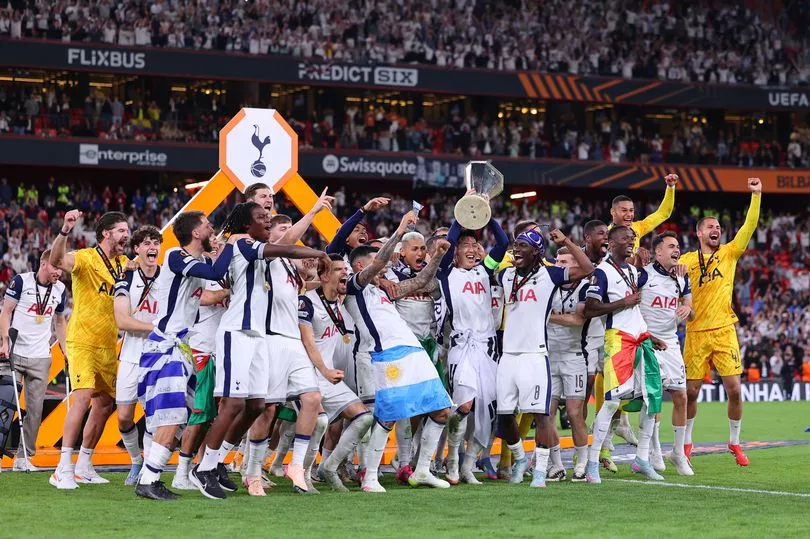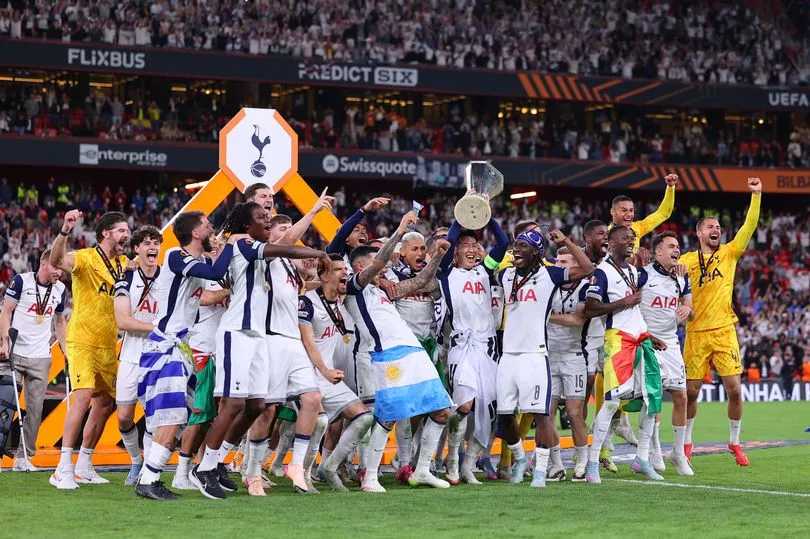Tottenham Hotspur have emerged from the shadows of a disappointing domestic campaign with a triumphant victory that rewrote the club’s recent history.
Their 1-0 win over Manchester United in the Europa League final at the Estadio de San Mamés in Bilbao not only ended a 16-year wait for silverware but also secured their first European title since 1984.
For the club, the players, and especially manager Ange Postecoglou, the night in Spain offered a redemption arc that may well reshape the future of Tottenham Hotspur Football Club.
While football is fundamentally driven by glory, the modern game is inseparably tied to finances. Success on the pitch brings more than just medals and memories—it unlocks doors to revenue streams that fuel growth and sustainability.
For Tottenham, the Europa League victory wasn’t merely about breaking a trophy drought; it was a high-stakes showdown with financial implications that could impact their strategic direction for seasons to come.
This season, both Spurs and United have floundered in the Premier League, a surprising fall from grace for clubs once touted as cornerstones of the so-called ‘big six.’
At one stage, both teams found themselves hovering dangerously above the relegation zone, underscoring the significance of the Europa League as not just a second-tier competition, but a vital lifeline.
The reward for triumphing in Bilbao is multifaceted. Beyond pride, prestige, and celebration, Spurs secured qualification for the lucrative UEFA Champions League—a platform that drastically elevates a club’s global appeal and financial outlook.
Spurs were not staring down the barrel of profit and sustainability regulation breaches, nor were they in danger of failing UEFA’s squad cost ratio. Still, the club needed a cash injection to comfortably navigate the coming transfer window without being forced into a fire-sale of valuable assets. Last night’s win addressed that need and then some.

Tottenham’s journey through the Europa League this season generated substantial returns. Prize money, participation fees, and UEFA’s value distribution—based on market size and performance—collectively earned the club £35.4 million.
When factoring in matchday revenue from home fixtures, which average around £4.9 million per game, the total swelled to approximately £69.7 million. But the financial windfall doesn’t stop there.
By qualifying for the revamped Champions League league phase, Spurs stand to gain even more. Participation alone earns the club £15.6 million. With each victory in the league phase netting £1.7 million and draws worth £580,000, the group stage alone promises another potential £20 million in revenue.
On top of this, the Champions League value pillar—more generous than its Europa League counterpart—could bring an additional £20 million. Then there’s the boost from matchday earnings.
The guaranteed four home games in the Champions League league phase are expected to generate around £19.6 million, with the potential for more in knockout rounds. This level of income dwarfs any domestic shortfalls and puts Spurs in a commanding financial position ahead of the summer transfer window.
The club’s victory in Europe now cushions what could have been a severe blow from their low Premier League finish. Last season’s merit payments from the Premier League were significantly higher, and this year, Spurs stand to receive up to £31.5 million less.
However, the additional European revenue and increased matchday income more than compensate for this loss, allowing the club to pursue squad improvements without financial strain.
The challenge Spurs faced before the final was real. Their transfer debt has ballooned over the years, primarily fueled by high-profile signings and the cost of relocating to their state-of-the-art stadium.
As of the latest accounts for the 2023/24 season, Spurs owed £337 million in transfer payables—second only to Chelsea in the Premier League—up sharply from £88 million in 2019. On the other side, they were owed £58 million from player sales, leaving a significant gap of £279 million.
Despite this, Spurs remain within a healthy position under PSR guidelines, which allow losses up to £105 million with deductions for infrastructure, youth development, and community projects.
Much of their debt stems from stadium investment, and their strong commercial and matchday income streams, combined with a lean wage-to-revenue ratio, have kept them compliant.
Still, there had been real concerns about their decreasing cash reserves. As of March 31, 2024, the club’s cash balance stood at £79 million, a stark drop from £198 million the previous year.
They had been dipping into these reserves over the past 18 months, raising fears that another trophy-less, Europe-less campaign could spell deeper financial trouble.
Thanks to their win in Bilbao, those fears have been alleviated. The club not only avoided a financial black hole but now finds itself with the leverage to act decisively in the transfer market.
With Champions League football on the calendar, Spurs can attract higher-caliber players, appeal to global commercial partners, and reassert their relevance on the international stage. Even potential investors are likely to view the club in a more favorable light now that they’ve returned to elite European competition.
Though their domestic season fell far short of expectations, Tottenham Hotspur salvaged more than just pride—they reignited ambition, opened new financial pathways, and gave themselves the foundation for a renewed era of competitiveness.
There are still lessons to learn and areas to rebuild, but after one unforgettable night in Bilbao, the future suddenly looks far brighter.

